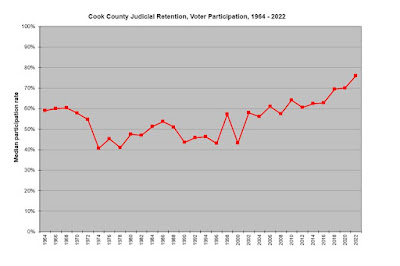And Judge Lyle will assume Justice Cunningham's case load when she arrives (Justice Joy V. Cunningham, you will recall, having been appointed to the Illinois Supreme Court).
However, owing to what the Supreme Court describes as a "clerical error," the Supreme Court entered a "
Corrected Order" this past Friday indicating that Judge Lyle is being assigned "to the position currently held by the Honorable Cynthia Y. Cobbs, who is being reassigned to the Appellate Court of Illinois, First District."
Which means... depending on what is meant by a
separate order also entered Friday... that Justice Cobbs, a Circuit Court judge already serving by assignment to the Appellate Court, is now in the 'up or out' slot. Probably.
Here's where the potential confusion comes from: Justice Cobbs has not been
appointed to the Appellate Court. Rather, the order states that Justice Cobbs "is reassigned to duty in the Appellate Court of Illinois, First District, to the position currently held by the Honorable Joy V. Cunningham, who is being appointed to the Supreme Court of Illinois." So she has been put in Cunningham's
slot, but keeps her own caseload.
In contrast, in 2020, the Supreme Court expressly
appointed Justice Robert E. Gordon, like Justice Cobbs a Circuit Court judge serving on the Appellate Court by appointment, to the vacancy of Justice Shelvin Louise Marie Hall.
However, because Friday's order expressly provides that Justice Cobbs' new 'assignment' will terminate on December 2, 2024, I
believe that the intention of Friday's order is that Justice Cobbs would have to run for, and win, the Cunningham seat (or some other) on the Appellate Court in order to remain on that bench. On the other hand, because she has not been
appointed to the Cunningham vacancy, in the event that she is unsuccessful in her potential bid for the Cunningham vacancy, or if she chooses not to run, Cobbs would remain a judge of the Circuit Court after the expiration date of last week's reassignment (December 2, 2024).
If memory serves (and, because the Supreme Court website has since been updated, I can no longer pull up the 2018 order to double-check), the language in this order is similar to that employed in the older order reassigning Justice Hyman to a specific Appellate Court vacancy, with a definite end date: Justice Hyman ran for that vacany and won in 2020, but if he had fallen short, he would have remained on the Circuit Court bench. As it was, Hyman's Circuit Court seat came open when he won election to the Appellate Court and was filled in this most recent election cycle.




















